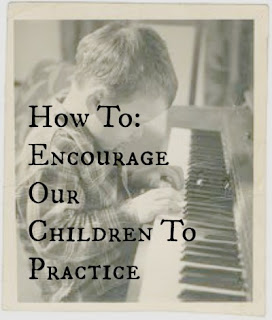It’s time once again for Heather Johnson from Family Volley to share some of her amazing Parenting Tips as part of her “Parenting Tips Series” here on The Idea Room. Here’s Heather in her own words.
–Amy
Do your children participate in extra curricular activities?
Is it hard to get them to practice? Is there whining and complaining?
You are not the only one. Trying to get our children to practice can be very stressful. It can bring contention, arguments and frustration into our homes.
As parents, we need to remember that practicing does more for our children than just make them better on the piano.
Practicing teaches our children valuable life skills. Skills like…
-
Self Discipline
-
Self Mastery
-
Time management
-
How to Prioritize
-
Setting and following through with goals
-
Accountability
-
Builds relationships
These are key qualities we need through our entire lives. They are important even after the piano lessons and football games are over. As parents we need to keep this in mind.
Getting our kids to practice can be really frustrating. The frustration can make us a little crazy, pushy and forceful.
For parents there can be a fine line between encouraging our children to practice and pushing too hard.
Can parents push too hard?
The answer is Yes. If we are pushing because we have our own agenda, then we are pushing too hard. If we are pushing our children and they are miserable and not
having any fun, then we need to re-evaluate because we are probably pushing too hard.
Understand, if we are going to push our children, then we need to be willing to be more creative to help them enjoy the activity and the practicing.
When we get frustrated, we often turn to bribes. Is it ever okay to bribe?
Bribery can be tricky, but we should try to keep away from using bribes to get our
children to practice. We should also steer clear of punishments to get our children to practice.
Keep in mind that these experiences during their childhood are life experiences that are preparing them for the future.
Bribes undermine the character building and internal motivation that extracurricular activities can foster.
They teach our children to only do something IF they get something in return.
We want our children to practice piano because they are learning a valuable talent and fulfilling commitments to themselves, their teacher and us as parents. Because it is the right thing to do. Instead of focusing on bribes, focus on rewards and incentives.
To do this…
- don’t reward for every practice.
- don’t talk about the gift or treat before, but instead present it AFTER practicing has been done.
- focus on setting goals. Once they are met, celebrate. These can be daily, weekly, or monthly depending on your child’s needs.
What do we do when our kids want to quit?
Just because our kids say they want to quit, doesn’t mean we let them. Kids usually want to quit because there is a problem. As parents we need to try and identify why they are unhappy in the activity. Could the activity be too hard for them? Maybe they don’t feel like they have any friends on the team or they don’t like the coach/teacher. Maybe their teammates are picking on them. Could they be over-scheduled? Or maybe they would rather do something else.
If you find your child asking to quit…
1. First, acknowledge their feelings. It is how THEY perceive things and the feelings are real to them. (Responding with “really”, or, “is that so” will help them feel validated).
2. Then, ask key questions to gather information…
“I thought you liked piano, what has changed”?
“What part of baseball are you struggling with”?
“What solution do you think would make you enjoy violin again”?
3. Remember to BE PRESENT.
It doesn’t matter the activity, attend practice whenever possible. You will learn a lot about their true feelings by watching them practice. Often times just attending practices will fix the problem. Kids don’t like being “sent off” to practice.
Even with piano. You don’t have to sit at the piano with them, but sit in the same room when they practice. Comment every now and again on what they are doing. It really does make a difference with practicing. We can’t always attend everything. Especially when we have more than one child, or work, but we can do our best to be at practices whenever possible.
If your child complains about going to practice, but once they are there they love it and come home talking about it, this is a pretty good sign that they DON’T need to quit, but address a problem instead.
If after asking the questions and observing, you conclude that your kids are in physical or psychological trouble, meaning that they are really, truly, unhappy with the activity, and stopping feels right…
1. It is okay to have them finish out what they have committed to.
Have them finish out the season, or continue until they perform in the recital. This will teach them to follow through on commitments
and if it is a team activity, it will teach them about fulfilling responsibilities to others. Plus, sticking it out will give our children a
sense of accomplishment.
2. Find something else that better fits their interest and personality.
We can’t loose sight of the bigger picture. We are helping our children develop life skills. These skills are much bigger than if they sat at the piano for 20 minutes, or not.
On top of that, we are making memories. Do we want our children to have memories filled with stress and arguing.
Getting our children to practice can be difficult and stressful. But, if we will work to make it fun and be open to our children’s thoughts and feelings, we can solve the problems and know when to let them stop, and when to help them push through.
Do your kids complain about practicing?
Do you believe in making your kids finish what they start?
Have a question or just want to say hello.
JOIN OUR NEWSLETTER
Would you like more Recipes, DIY, Printables and Organization Ideas?
Subscribing to the newsletter will enable us to periodically send you creative content exclusively for Idea Room subscribers.
*View our Privacy Policy here.







I just taught myself a new knitting skill which felt awkward. As I was doing it, I mentioned to my kids that it was new and I felt clumsy. They know I have been knitting for years and years but I wanted them to know that I do things that don’t come naturally until I repeat the motion over and over and over again. Thanks for the insight, Heather.
This is so timely Heather! We are struggling with this with one child in particular with Piano. She is very talented and is so close to developing a real talent. This is perfect and gave me some great tips for how to talk about it with her. As always you share great tips and information! xo
Oh, this is us and piano lessons too! My daughter is in a group class because she is only 5, and they play games and sing songs and dance and she has a blast but HATES practicing at home. It is probably because we don’t actually have a piano to practice on :) So I now sit next to her and play on our crayon-colored paper piano as I sing the notes and we do every step together and make it fun. It is hard for me to make the time to do it, but she is a natural and I need to help her with the talent she has!
Great article. There are fine dividing lines between bribery, rewarding and even celebrating success. I agree with you about rewards. Generally speaking, in our society, adults are paid for working, but it doesn’t mean that they are necessarily happy working for the sake of doing a good job. It is very important to help children with this ethic. You may be interested in the daily practice tips in the 100 Day Practice Diary from http://www.musicinpractice.com.
This is such a great article. My 5.5 year old has been playing violin for 2 years now and she loves it, but we still have the occasional fight about practice. I do find that there is more resistance when her little sister is “bothering” us and after reading this I am thinking that she probably doesn’t feel like I am “present” with her.
The biggest thing that has helped us, is consistency. We practice at (roughly) the same time every day. And that really works well for us. However, we are in a break between our spring and summer lessons and we haven’t been consistent. And after 2 days of struggling through practice, this article was what I needed to read today. Thanks!